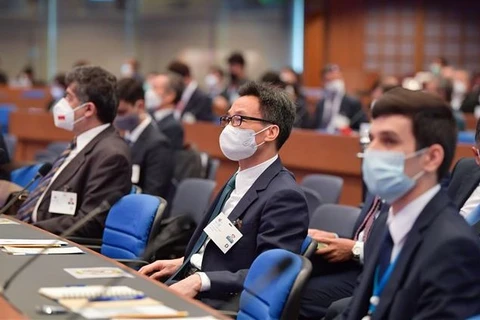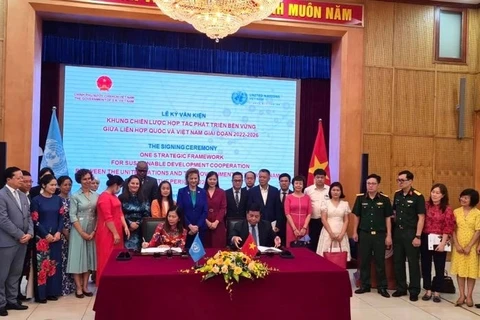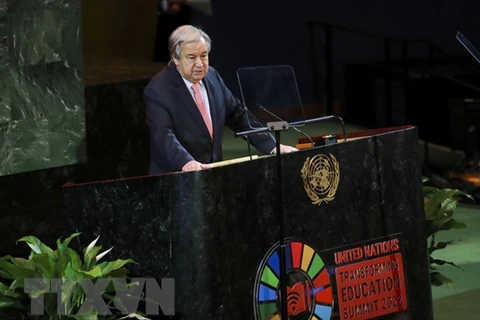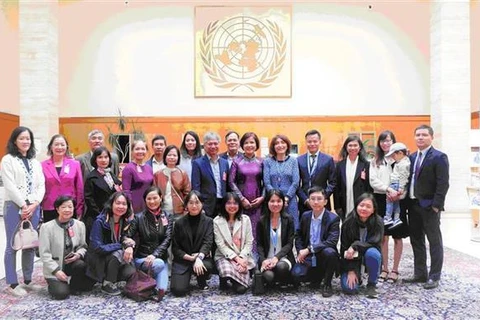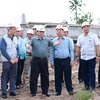Sydney (VNA) – Vietnam, a developing country, has exerted great efforts in achieving the UN Sustainable Development Goals (SDGs) and enjoyed fruitful results, said Professor Carl Thayer from the University of New South Wales (UNSW).
He cited the United Nations report in 2021 as saying that Vietnam is on the way to completing SDG 1 on poverty elimination.
Although the country is facing many challenges for SDG 2 on ending hunger, the country has shown certain improvements, he noted.
According to the report, Vietnam is ranked 51th among 165 countries in the SDG index, with a country score of 72.8. The country’s spillover is 96.4.
Overall, Vietnam, a developing country, has considerable experience in implementing the UN SDGs and can provide practical policy advice on issues affecting comprehensive human rights globally and regionally, Thayer underlined.
He highlighted Vietnam’s major contributions in the fight against COVID-19, saying that the country has worked hard to respond to the pandemic and protect public health and ensure healthcare services, while maintaining economic growth and social stability, he said.
Besides, as the Chair of ASEAN, Vietnam took the lead in organising online meetings among relevant ministers from member countries, showing its leading role in creating consensus in the region and measures to respond to the pandemic, said Thayer.
At the UN General Assembly, the Vietnamese leader, on behalf of developing countries, urged equality in vaccine access and the transfer of intellectual property rights in vaccine production to prevent the spread of COVID-19.
Vietnam was chosen as the location of the Regional Center for Disease Control, he added.
Regarding socio-economic progress in Vietnam, the professor highlighted that Vietnam's economic strategy is closely linked to the comprehensive growth and poverty reduction strategy launched in 2002. Vietnam has significantly reduced the poverty rate from 58% in 1992 to 15.5% in 2008, and 7.6% in 2013. Following the new criteria, the poverty rate of Vietnam in 2020 was 2.75%, with the living conditions of people in mountainous localities and ethnic minority-inhabited areas considerably improved.
In the first quarter of 2022, Vietnam recorded growth of 5.03%, and drew nearly 16.9 million USD in foreign direct investment. In the first eight months of this year, the investment hit a new record of nearly 16.8 billion USD. Meanwhile, the country’s export revenue was estimated at over 371 billion USD, up about 9.5% year-on-year, he said, adding that the figures reflected the confidence of the world business community in Vietnam. The country’s capacity in controlling COVID-19 and its political stability have created good conditions for Vietnam’s economic recovery, he asserted.
Last year, the Global Women's Summit honoured Vietnam with the Country Leadership Award in recognition for its efforts and achievements in advancing gender equality and women’s empowerment over the past two decades./.
He cited the United Nations report in 2021 as saying that Vietnam is on the way to completing SDG 1 on poverty elimination.
Although the country is facing many challenges for SDG 2 on ending hunger, the country has shown certain improvements, he noted.
According to the report, Vietnam is ranked 51th among 165 countries in the SDG index, with a country score of 72.8. The country’s spillover is 96.4.
Overall, Vietnam, a developing country, has considerable experience in implementing the UN SDGs and can provide practical policy advice on issues affecting comprehensive human rights globally and regionally, Thayer underlined.
He highlighted Vietnam’s major contributions in the fight against COVID-19, saying that the country has worked hard to respond to the pandemic and protect public health and ensure healthcare services, while maintaining economic growth and social stability, he said.
Besides, as the Chair of ASEAN, Vietnam took the lead in organising online meetings among relevant ministers from member countries, showing its leading role in creating consensus in the region and measures to respond to the pandemic, said Thayer.
At the UN General Assembly, the Vietnamese leader, on behalf of developing countries, urged equality in vaccine access and the transfer of intellectual property rights in vaccine production to prevent the spread of COVID-19.
Vietnam was chosen as the location of the Regional Center for Disease Control, he added.
Regarding socio-economic progress in Vietnam, the professor highlighted that Vietnam's economic strategy is closely linked to the comprehensive growth and poverty reduction strategy launched in 2002. Vietnam has significantly reduced the poverty rate from 58% in 1992 to 15.5% in 2008, and 7.6% in 2013. Following the new criteria, the poverty rate of Vietnam in 2020 was 2.75%, with the living conditions of people in mountainous localities and ethnic minority-inhabited areas considerably improved.
In the first quarter of 2022, Vietnam recorded growth of 5.03%, and drew nearly 16.9 million USD in foreign direct investment. In the first eight months of this year, the investment hit a new record of nearly 16.8 billion USD. Meanwhile, the country’s export revenue was estimated at over 371 billion USD, up about 9.5% year-on-year, he said, adding that the figures reflected the confidence of the world business community in Vietnam. The country’s capacity in controlling COVID-19 and its political stability have created good conditions for Vietnam’s economic recovery, he asserted.
Last year, the Global Women's Summit honoured Vietnam with the Country Leadership Award in recognition for its efforts and achievements in advancing gender equality and women’s empowerment over the past two decades./.
VNA

